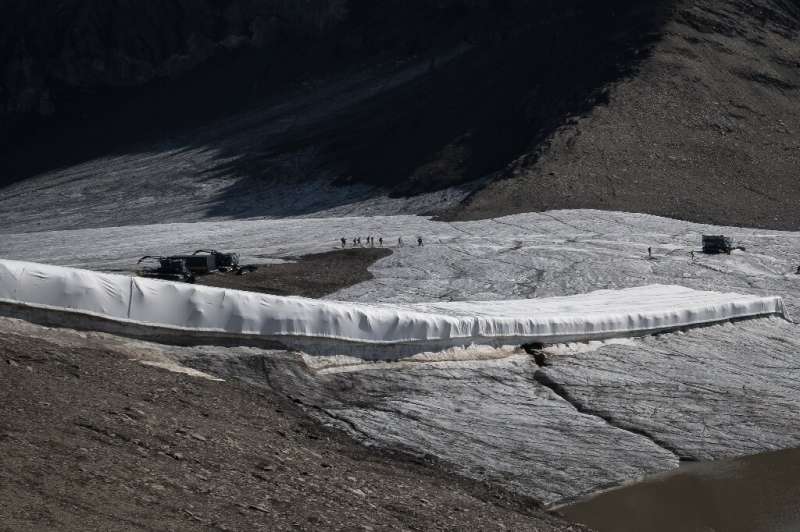CHINA'S MIDDLE CLASS STRIKE
'Hopeless': Chinese homebuyers run out of patience with developersBeiyi SEOW
Thu, August 11, 2022

Newly married and with his first child on the way, auto worker Wang wanted to move into the apartment he bought in Wuhan three years ago but those hopes were dashed by China's ballooning property crisis.
Saddled with $300,000 in debt and with his unit nowhere near completion, the 34-year-old decided he had had enough and stopped making mortgage payments.
He is among numerous homebuyers across dozens of cities in China who have boycotted payments over fears that their properties will not be completed by cash-strapped, debt-laden developers.
"They said construction would resume soon," Wang told AFP, only giving his surname. "But no workers showed up."
Beijing-based Wang was planning to start a family after purchasing the home.
"It wasn't easy for us to buy this home. It all came from my savings," said Wang.
"Now there's no home, and we still owe two million yuan ($300,000) in mortgage payments."
After years of explosive growth fuelled by easy access to loans, Chinese authorities launched a crackdown on excessive debt in 2020.

That squeezed financing options for property sector giants such as Evergrande, as they struggled to make repayments and restructure mountains of debt.
Now they are facing mortgage boycotts and government pressure to deliver pre-sold homes.
In Wuhan, the capital of Hubei province, buyers such as Wang said they received multiple postponement notices on their apartments from developer Myhome Real Estate, months past the promised delivery date in late 2021.
The builder said in a notice this week that it had managed to release some frozen funds, adding that it expects to complete the Wuhan project in late 2022.
Wang said he stopped repayments this month, and that complaints to authorities in the city did not make a difference.
"There's no hope in life, carrying on with payments like this."
- 'Our hearts are cold' -
The "crisis of confidence" in China's housing market points to structural flaws, said Andrew Batson of Gavekal Dragonomics in a recent report.

Because of their heavy reliance on selling apartments in advance, developers pursued business models that exposed buyers to the risk of not getting their homes, he added.
As financially stressed firms halt construction on projects, "those risks have dramatically materialised".
The crisis has left homebuyers in limbo.
"I thought it would never happen," a Wuhan homebuyer surnamed Hu said of his unfinished home.
The 25-year-old said his family took out loans to help with the down payment for a three-room flat in 2018.
At that time, Wuhan was encouraging college graduates such as Hu to get household registrations in the city, he said.
Known as "hukou", these all-important government registrations allow access to healthcare and schools.
"Everyone was buying property back then... people were vying for it," he said.
Another young homebuyer Xue said almost all of his salary now goes to rent and mortgage payments.
"I don't want to pay any more," the 24-year-old said. "Our hearts are cold."
"It's not that we disregard the law or contracts, but this situation puts us under too much pressure."
Xue's family put down 800,000 yuan for the flat while he took on a 600,000 yuan loan that he has been repaying for two years.
Buyers in Wuhan told AFP there have been protests over unfinished pre-sold homes in the city.
- Vicious cycle -

Homebuyers in around 100 cities -- involving more than 300 housing projects -- have boycotted mortgage payments, according to a crowdsourced document named "WeNeedHome".
Many are in central Henan's provincial capital Zhengzhou, where authorities have set up a fund to help developers complete projects.
Other affected cities include Chongqing and Changsha.
There have also been allegations of financial mismanagement, and some cities have called on banks to tighten their oversight of escrow accounts, according to local media reports.
Nomura analysts estimate that Chinese developers have only delivered around 60 percent of homes they pre-sold between 2013 and 2020.
In those years, China's outstanding mortgage loans rose by 26.3 trillion yuan, Nomura added.
The property sector's woes were thrown into sharp relief last year when it emerged that Evergrande was having trouble repaying its creditors, sparking panic that the industry, which accounts for around a quarter of China's GDP, was on the brink of collapse.
Homebuyers' ability to make mortgage payments is not the main issue, said Oxford Economics lead economist Tommy Wu in a report.
But a loss of confidence in developers will worsen the real estate downturn, he added.
"The chance of a vicious cycle -- declining housing sales and prices, mounting developers' distress, and deteriorating local government finances -- developing is concerning."
Thu, August 11, 2022

Newly married and with his first child on the way, auto worker Wang wanted to move into the apartment he bought in Wuhan three years ago but those hopes were dashed by China's ballooning property crisis.
Saddled with $300,000 in debt and with his unit nowhere near completion, the 34-year-old decided he had had enough and stopped making mortgage payments.
He is among numerous homebuyers across dozens of cities in China who have boycotted payments over fears that their properties will not be completed by cash-strapped, debt-laden developers.
"They said construction would resume soon," Wang told AFP, only giving his surname. "But no workers showed up."
Beijing-based Wang was planning to start a family after purchasing the home.
"It wasn't easy for us to buy this home. It all came from my savings," said Wang.
"Now there's no home, and we still owe two million yuan ($300,000) in mortgage payments."
After years of explosive growth fuelled by easy access to loans, Chinese authorities launched a crackdown on excessive debt in 2020.

That squeezed financing options for property sector giants such as Evergrande, as they struggled to make repayments and restructure mountains of debt.
Now they are facing mortgage boycotts and government pressure to deliver pre-sold homes.
In Wuhan, the capital of Hubei province, buyers such as Wang said they received multiple postponement notices on their apartments from developer Myhome Real Estate, months past the promised delivery date in late 2021.
The builder said in a notice this week that it had managed to release some frozen funds, adding that it expects to complete the Wuhan project in late 2022.
Wang said he stopped repayments this month, and that complaints to authorities in the city did not make a difference.
"There's no hope in life, carrying on with payments like this."
- 'Our hearts are cold' -
The "crisis of confidence" in China's housing market points to structural flaws, said Andrew Batson of Gavekal Dragonomics in a recent report.

Because of their heavy reliance on selling apartments in advance, developers pursued business models that exposed buyers to the risk of not getting their homes, he added.
As financially stressed firms halt construction on projects, "those risks have dramatically materialised".
The crisis has left homebuyers in limbo.
"I thought it would never happen," a Wuhan homebuyer surnamed Hu said of his unfinished home.
The 25-year-old said his family took out loans to help with the down payment for a three-room flat in 2018.
At that time, Wuhan was encouraging college graduates such as Hu to get household registrations in the city, he said.
Known as "hukou", these all-important government registrations allow access to healthcare and schools.
"Everyone was buying property back then... people were vying for it," he said.
Another young homebuyer Xue said almost all of his salary now goes to rent and mortgage payments.
"I don't want to pay any more," the 24-year-old said. "Our hearts are cold."
"It's not that we disregard the law or contracts, but this situation puts us under too much pressure."
Xue's family put down 800,000 yuan for the flat while he took on a 600,000 yuan loan that he has been repaying for two years.
Buyers in Wuhan told AFP there have been protests over unfinished pre-sold homes in the city.
- Vicious cycle -

Homebuyers in around 100 cities -- involving more than 300 housing projects -- have boycotted mortgage payments, according to a crowdsourced document named "WeNeedHome".
Many are in central Henan's provincial capital Zhengzhou, where authorities have set up a fund to help developers complete projects.
Other affected cities include Chongqing and Changsha.
There have also been allegations of financial mismanagement, and some cities have called on banks to tighten their oversight of escrow accounts, according to local media reports.
Nomura analysts estimate that Chinese developers have only delivered around 60 percent of homes they pre-sold between 2013 and 2020.
In those years, China's outstanding mortgage loans rose by 26.3 trillion yuan, Nomura added.
The property sector's woes were thrown into sharp relief last year when it emerged that Evergrande was having trouble repaying its creditors, sparking panic that the industry, which accounts for around a quarter of China's GDP, was on the brink of collapse.
Homebuyers' ability to make mortgage payments is not the main issue, said Oxford Economics lead economist Tommy Wu in a report.
But a loss of confidence in developers will worsen the real estate downturn, he added.
"The chance of a vicious cycle -- declining housing sales and prices, mounting developers' distress, and deteriorating local government finances -- developing is concerning."













